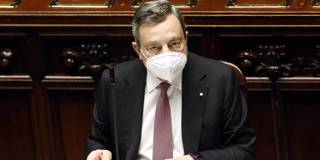If the Italian prime minister’s €235 billion economic recovery plan succeeds, it will change the European conversation, so that neighborly solidarity and fiscal risk-taking are seen as good investments. If it fails, the EU’s recovery plan will be remembered as a waste of money and fiscal conservatism will regain the upper hand.
PARIS – To be the prime minister of Italy is to hold one of the world’s worst jobs. To paraphrase the English philosopher Thomas Hobbes, life in this post is usually nasty, brutish, and short. Very short, in fact: Since Angela Merkel became chancellor of Germany in 2005, she has had eight different Italian counterparts.
Unsurprisingly, Italian leaders achieve little under such conditions. By the time the COVID-19 crisis hit, German GDP per capita had grown by 20% since Merkel took office, while Italy’s had declined by 4% during the same period.
Although it is unclear how long current Prime Minister Mario Draghi, a former president of the European Central Bank, will remain in office, the odds are that he will be true to tradition. Speculation in Rome is that he might run for president – a position with influence, but not power – in 2022 or 2023. But, as Draghi’s ambitious economic recovery plan makes clear, the expected shortness of his tenure is not preventing him from being bold.

PARIS – To be the prime minister of Italy is to hold one of the world’s worst jobs. To paraphrase the English philosopher Thomas Hobbes, life in this post is usually nasty, brutish, and short. Very short, in fact: Since Angela Merkel became chancellor of Germany in 2005, she has had eight different Italian counterparts.
Unsurprisingly, Italian leaders achieve little under such conditions. By the time the COVID-19 crisis hit, German GDP per capita had grown by 20% since Merkel took office, while Italy’s had declined by 4% during the same period.
Although it is unclear how long current Prime Minister Mario Draghi, a former president of the European Central Bank, will remain in office, the odds are that he will be true to tradition. Speculation in Rome is that he might run for president – a position with influence, but not power – in 2022 or 2023. But, as Draghi’s ambitious economic recovery plan makes clear, the expected shortness of his tenure is not preventing him from being bold.